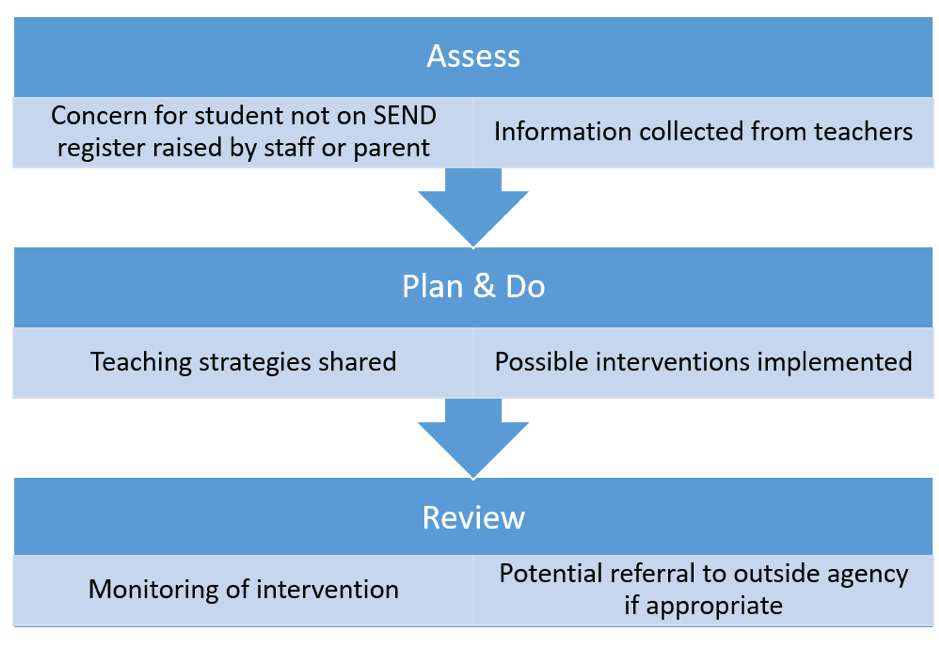SEND
Orchard Park High School provides support for students with a wide range of Special Educational Needs and Disabilities (SEND).
We recognise the importance of developing a 'learning triangle' between the school, students and their parents/carers. Each child on the SEND register will have a Pupil passport created for them with the parent and child to celebrate their strengths, address their needs and share clear support for all staff to support your child.
All students have an entitlement to a broad, balanced and relevant curriculum. We believe that all students with additional needs should be taught wherever possible, with their peers in mainstream classes by subject specialists who use a range of teaching methods and strategies to develop students' knowledge, skills and understanding.
Our ELP and EHCP students have their PSHE lessons delivered in smaller groups, outside of their normal classes and led by teaching assistants. These sessions will take place in different areas of the library, providing a safer environment where students can progress at a slower pace and feel comfortable asking questions they might otherwise hesitate to raise in a normal classroom setting.
The Croydon Local Offer can be found on their website here.
Our latest SEN Information report can be found on our policies and documents page here.
SEND identification process
- Every teacher is a teacher of SEND. All teachers are trained regularly throughout the year in key teaching strategies to support SEND pupils in the classroom.
- Each week teachers are highlighted a Key Stage 3 and 4 student with SEND need and how best to support them, feedback is then sought to ensure teachers are supporting learners.
- Staff have a wealth of resources online as well as our ‘SEND Corner’ in the staffroom to support.
- All students' Pupil Passports are directly linked to their Bromcom profile so they are easily accessible by staff when planning their lessons.

Literacy support
Interventions at Orchard Park
We offer a wide range of interventions for students at Orchard Park. These are completed on a short term basis, run by our excellent team of teaching assistants. They are added to intervention through discussion with the SENCO, SEND team and teaching and pastoral staff to best meet a student's needs.
|
Intervention name |
Objective |
|
Dyslexia |
Students who have screened highly for dyslexia have an intervention to support them with their comprehension and phonological awareness. This should help build confidence and understanding in longer written pieces of work. |
|
EAL |
Students are removed from their 4th option block and supported with small group work to improve their English. |
|
ELSA |
Emotional Literacy is a 1:1 intervention where students are supported in understanding their own feelings, how to recognise them and react in appropriate ways in social situations. |
|
Handwriting |
Run for a half term at a time and then assess. This practice is done to help improve OT skills and improve handwriting for the students. |
|
RWI |
Read, Write, Inc is a phonics intervention that supports our most vulnerable students with accessing and improving their vocabulary, reading comprehension and oracy. |
|
SALT |
Speech and Language therapy happens once a week for our ELP students by a therapist who comes into school. They address misconceptions and support them in furthering their understanding. |
|
Social skills |
Our ELP students also have a social skills group where they practice talking to each other, problem solving and turn taking. |
|
Stepping Stones |
At tutor time, students are supported further with their organsation, a tick list of their equipment, problem solving and then tutor reading. |
|
Vocab |
Students in the ELP receive additional vocab lessons in replacement of their language lessons. Students discuss and break down key vocabulary from the week and are supported by their teaching assistant. |
|
Zones of Regulation |
This is a group intervention that supports students in recognising when they are in different 'zones'. For example, being angry or sad and techniques of how to move back to the 'green' zone as this is best for learning. |
SEND support at Orchard Park
Please download the PowerPoint presentation here.

